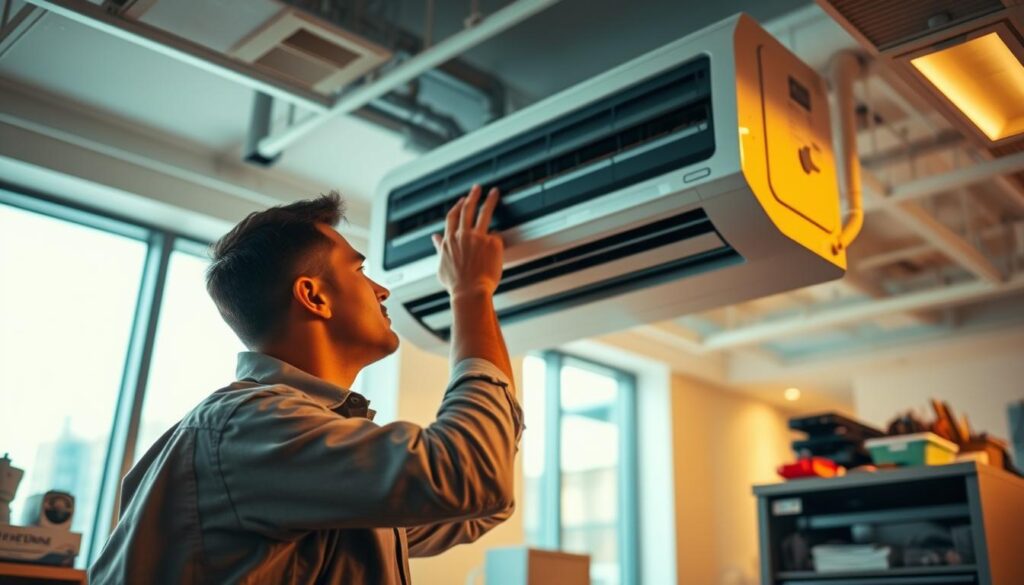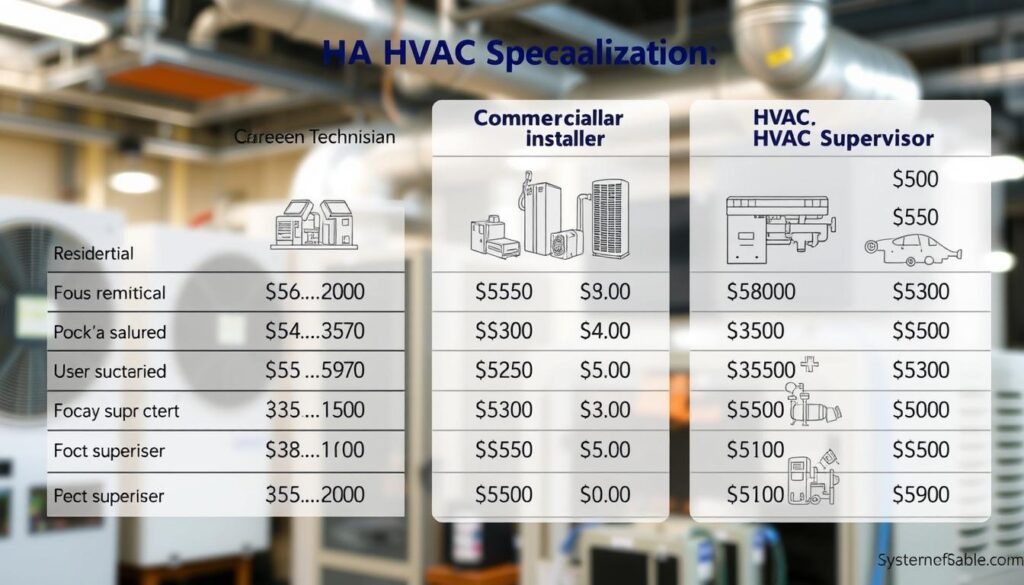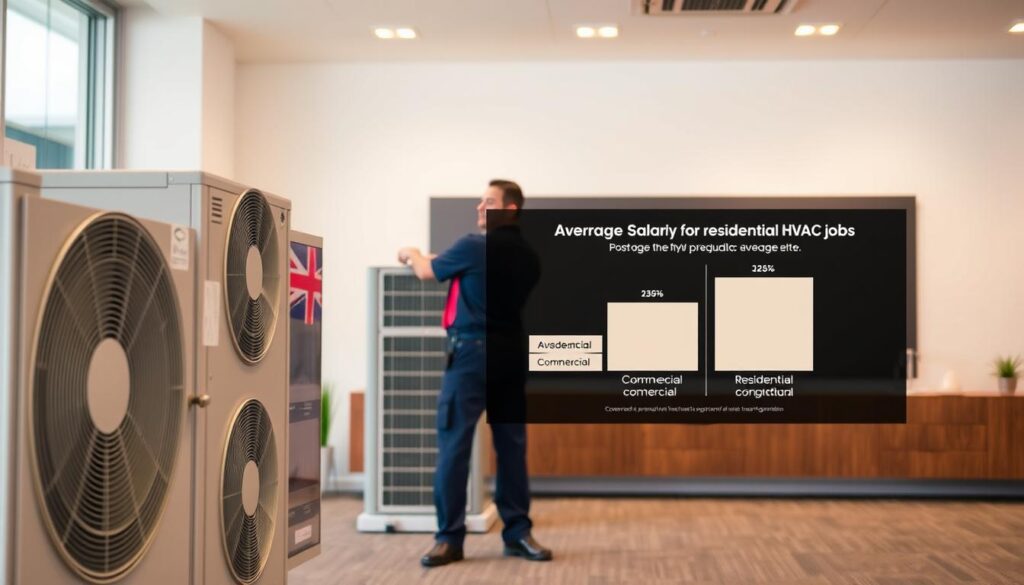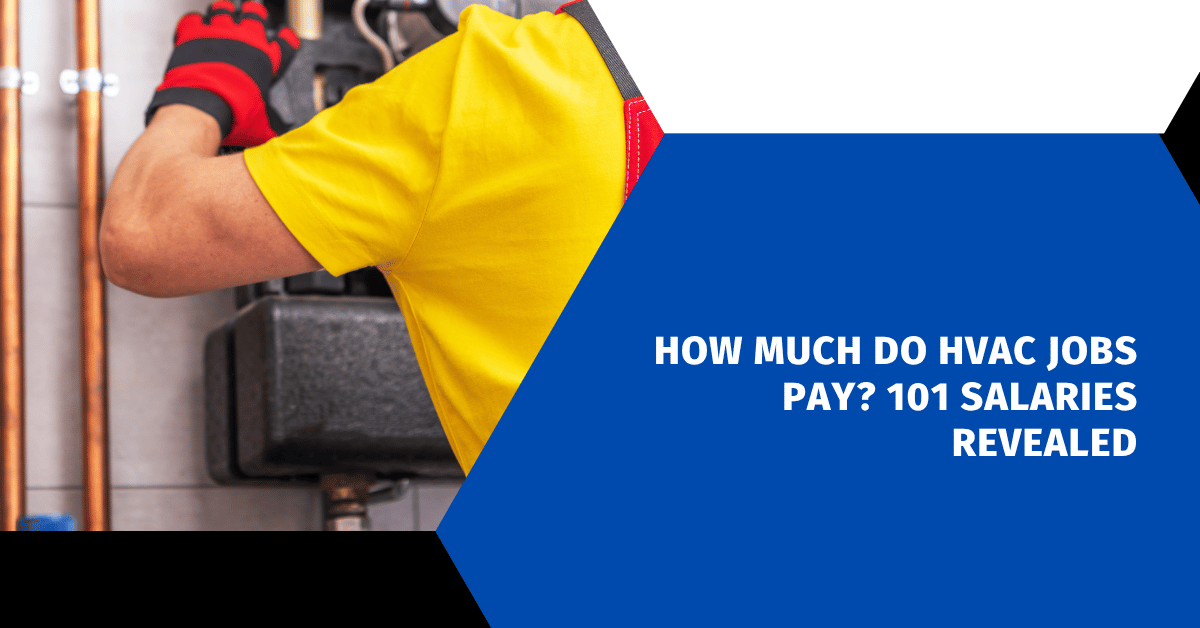Affiliate Disclosure
HVAC Guide Guys is a participant in the Amazon Services LLC Associates Program, an affiliate advertising program designed to provide a means for sites to earn advertising fees by advertising and linking to Amazon.
How Much Do HVAC Jobs Pay? Are you curious about how much money you could earn as an HVAC technician? The world of heating, ventilation, and air conditioning offers surprisingly lucrative opportunities. These might just blow you away.

Exploring HVAC jobs, you’ll find a dynamic career path with competitive salaries. The HVAC technician salary landscape is more promising than many people realize. It offers significant financial growth and stability.
The average HVAC technician in the United States earns around $48,730 per year. This is about $23.43 per hour. But this is just the beginning of your earning journey.
Your salary will depend on several factors. These include experience, location, specialization, and additional skills. Whether you’re starting out or looking to advance, the HVAC industry offers exciting financial prospects.
Key Takeaways
- Average HVAC technician salary is $48,730 annually
- Hourly rates typically range from $20 to $30
- Earnings increase with experience and specialization
- Location significantly affects salary
- Advanced certifications can boost earnings
Table of Contents
Understanding HVAC Technician Base Salaries
Your earnings as an HVAC technician depend on experience, location, and skills. Knowing about hvac installer wages helps plan your career in this field.
The HVAC career offers great chances for those who grow their skills. Salaries change a lot based on your experience and how much you learn.
National Average Earnings Snapshot
HVAC technicians in the U.S. get good pay. Here’s what you can expect:
- Entry-level positions: $40,000 – $50,000 annually
- Mid-career technicians: $55,000 – $65,000 annually
- Experienced professionals: $65,000 – $75,000 annually
Entry-Level vs Experienced Pay Rates
As you gain experience, your pay goes up. Entry-level HVAC technicians start at about $45,760 a year. Those with 10+ years of experience can earn up to $68,286.
Salary Ranges by Experience Level
Your income grows as you move up in your HVAC career. Here are the usual salary steps:
- 0-2 years: Learning and setting up basic skills
- 3-5 years: Building specialized knowledge
- 6-9 years: Getting advanced technical skills
- 10+ years: Leading and consulting roles
“Invest in continuous learning and certification to maximize your HVAC career pay.” – Industry Expert
Explore Our HVAC Shop
Looking for top-rated HVAC tools, parts, and accessories? Visit our shop and find the perfect solution for your needs.
Visit the ShopTop-Paying States for HVAC Professionals
Your salary as an HVAC engineer can change a lot based on where you work. Some places pay HVAC pros a lot more than others. This makes where you work very important for your salary.
Looking at salaries across the U.S., some states really stand out. They offer great pay for HVAC workers. Things like the local economy, how much people need HVAC services, and living costs all affect these salaries.
| State | Average Annual Salary | Key Market Factors |
|---|---|---|
| Alaska | $72,291 | Extreme climate, limited workforce |
| Connecticut | $70,029 | High-density urban areas, robust infrastructure |
| Massachusetts | $68,489 | Tech-driven economy, extensive commercial sectors |
It’s not just about where you live in the HVAC field. Think about:
- Local market demand
- Specialized skill sets
- Years of professional experience
- Additional certifications
Pro tip: While these top-paying states have great salaries, remember to think about living costs and career growth too.
How Much Do HVAC Jobs Pay in Major Cities
HVAC contractor earnings change a lot in different cities across the United States. How much you can earn depends on the city you work in. Some cities pay a lot more than others.
Metropolitan Areas with Highest Wages
Some cities pay HVAC workers a lot more than others. Here are the top cities for high salaries:
- Danbury, Connecticut: $110,094 average annual salary
- Gaithersburg, Maryland: $101,961 average annual salary
- San Francisco, California: $95,202 average annual salary
Cost of Living Impact on Salaries
Even though these cities pay well, remember the cost of living. A high salary in a pricey city might not go as far as a lower salary in a cheaper place.
| City | Average HVAC Salary | Cost of Living Index |
|---|---|---|
| San Francisco, CA | $95,202 | 269.3 |
| Gaithersburg, MD | $101,961 | 154.2 |
| Danbury, CT | $110,094 | 135.7 |
Urban vs Suburban Pay Differences
Urban areas usually have higher HVAC salaries because of more demand and higher costs. Suburbs might pay less but offer more stable jobs and lower living costs.
Your location is key to your HVAC career earnings. Look into local markets and think about more than just salary. This will help you make better career choices.
Explore Our HVAC Shop
Looking for top-rated HVAC tools, parts, and accessories? Visit our shop and find the perfect solution for your needs.
Visit the ShopHVAC Career Specializations and Their Earnings

HVAC careers offer many paths and pay levels. Your salary can change a lot based on your chosen role.
Each HVAC specialization has its own pay range. To earn more, focus on areas where you’re really good:
- Installation Specialists: Make $45,000 to $55,000 a year
- Service Technicians: Earn $55,000 to $65,000 yearly
- Maintenance Experts: Get paid $50,000 to $60,000
- Commercial HVAC Technicians: Can earn up to $70,000
Learning about new tech can really up your pay. Skills in smart homes, energy-saving systems, and advanced cooling are in high demand.
“The more specialized your skills, the more valuable you become in the HVAC industry.” – HVAC Industry Expert
To make more money, get better at:
- Green tech installations
- Smart building systems
- Industrial cooling
- Advanced controls
Your HVAC career grows with learning and skills. Get certified, take advanced courses, and specialize to boost your pay and success.
Education and Certification Impact on Salary
Advancing in your HVAC career is more than just getting experience. It’s about growing your skills. Getting certified and educated can really boost your salary and open up more job opportunities.
Getting certified can make a big difference in your salary. Certified HVAC technicians can earn 10-15% more than those without certifications. This shows how important education is for career growth.
Required Certifications for Career Growth
- EPA Section 608 Certification (mandatory for handling refrigerants)
- NATE (North American Technician Excellence) Certification
- HVAC Excellence Professional Level Certification
- R-410A Certification for modern cooling systems
Advanced Training Benefits
Advanced training does more than teach you new things. It gives you real benefits that can increase your salary:
- Specialized skill development
- Access to higher-paying technical roles
- Increased marketability
- Opportunities for advanced positions
Continuing Education Opportunities
The HVAC field is always changing with new technologies. Keeping up with these changes through ongoing learning helps you stay competitive. This can lead to higher salaries.
| Certification Level | Average Salary Increase | Career Impact |
|---|---|---|
| Entry-Level Certification | 5-10% | Basic professional qualification |
| Advanced Certification | 15-25% | Specialized technical roles |
| Master Certification | 25-40% | Leadership and expert positions |
Pro Tip: Many employers help pay for certifications through tuition reimbursement. This makes learning more affordable and accessible.
Explore Our HVAC Shop
Looking for top-rated HVAC tools, parts, and accessories? Visit our shop and find the perfect solution for your needs.
Visit the ShopCommercial vs Residential HVAC Pay Scales

Looking into hvac installer wages shows big differences between commercial and residential HVAC. Commercial HVAC workers make more because of the complex systems and special skills needed.
Hvac profession income changes a lot between these areas. Home and apartment systems are simpler for residential techs. But, commercial HVAC deals with complex gear in big buildings and factories.
- Commercial HVAC systems need advanced technical knowledge
- Residential work means more direct customer contact
- Industrial projects need higher precision and special training
| HVAC Sector | Average Annual Salary | Complexity Level |
|---|---|---|
| Residential HVAC | $45,000 – $65,000 | Low to Moderate |
| Commercial HVAC | $60,000 – $85,000 | High |
| Industrial HVAC | $70,000 – $95,000 | Very High |
Your career choice greatly affects your earnings. Commercial HVAC pros often need advanced certifications for better pay. Skills in complex systems, energy saving, and detailed diagnostics can really up your income.
Deciding between residential and commercial HVAC depends on your skills, goals, and what you like. Both offer good chances for growth and good pay.
Experience-Based Salary Progression
Your HVAC engineer income can grow a lot as you get more experience. The first years are key for learning and mastering HVAC systems.
As you work, your salary will go up. Starting out, you might earn less. But, with the right moves, you can make a lot more money.
- 0-1 years: Approximately $41,716 annual earnings
- 5-10 years: Could reach $60,000-$75,000
- 15-20 years: Could hit $85,000-$94,575
Several things can help you earn more:
- Technical expertise in complex HVAC systems
- Specialized certifications
- Advanced technical skills
- Project management abilities
As you get more experience, you’ll have more chances. You might move into supervisory roles, specialized tech jobs, or consulting. These can really increase your income.
Investing in continuous learning and skill development is the most reliable path to maximizing your HVAC trade salaries.
Making smart career choices can turn a starting job into a well-paying career. This can lead to big earnings over time.
Explore Our HVAC Shop
Looking for top-rated HVAC tools, parts, and accessories? Visit our shop and find the perfect solution for your needs.
Visit the ShopSkills That Command Higher HVAC Salaries
To earn more as an HVAC contractor, you need more than basic skills. The best HVAC pros know that special skills can really boost their pay. Learning new skills is key to making more money.
Technical Specializations That Pay
Some technical skills can make you more valuable in HVAC. Being good at certain things can mean more money:
- Energy-efficient system design
- Advanced refrigeration techniques
- Industrial HVAC systems
- Programmable logic controller (PLC) programming
Software and Smart Systems Expertise
Today’s HVAC pros need to know tech well. Knowing about smart home tech and control systems can make you stand out. Digital skills are now a must for better pay.
Project Management Capabilities
Being able to handle big HVAC projects can really up your pay. Those who lead well and organize well often earn more. This is true, even when moving up to supervisory roles.
“Technical skills get you hired, but project management skills help you advance.” – HVAC Industry Expert
By always learning and getting better at different things, you can aim for better-paying jobs in HVAC.
Conclusion
Looking into HVAC jobs shows a promising career path. Your salary can change based on where you work, your skills, and how much you learn. The pay rates show big chances for growth in this key field.
New tech and energy-saving systems are changing HVAC. Getting better at your job and getting new certifications can lead to better pay. Cities and big commercial places usually pay more.
Working in HVAC can be very rewarding if you keep learning and growing. You can start at the bottom and move up, earning more as you go. Staying up-to-date and improving your skills will help you find the best jobs.
If you’re thinking about starting in HVAC or moving up, knowing about salaries is key. Look into local jobs, get the right certifications, and be open to new areas. Your hard work and learning will pay off in this fast-changing field.

